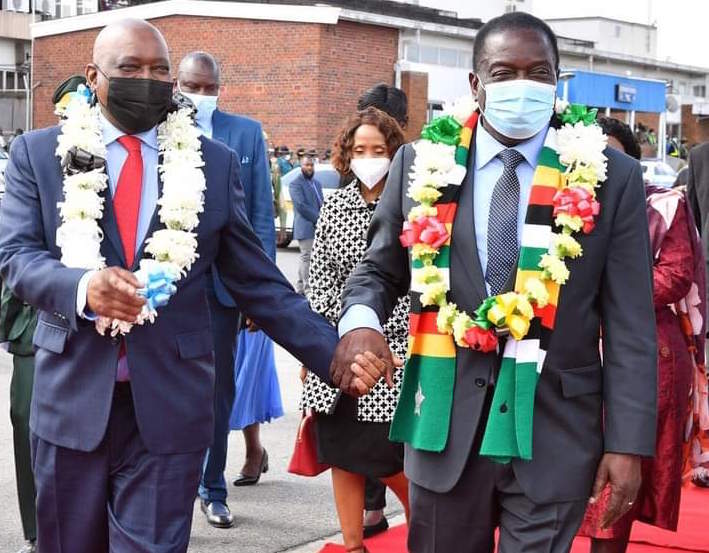|
Getting your Trinity Audio player ready...
|
His Excellency Dr. Mokgweetsi Masisi, the President of the Republic of Botswana has reiterated the importance of agricultural development and food security on the African continent.
He made the remarks today in Harare in his keynote address during the official opening of the Zimbabwe Agricultural Show where he was the Guest of Honour.
“First and foremost, exactly six months and 8 days ago, in Victoria Falls, here in the Republic of Zimbabwe, our two countries solidified and formalized collaboration in the area of agriculture, by signing a Memorandum of Understanding (MoU) in the field of agricultural development and food security.
“That notwithstanding, Botswana and Zimbabwe have longstanding bonds of friendship and collaboration, dating back to time immemorial. Since the establishment of our diplomatic relations following the attainment of independence by Zimbabwe in 1980, we have seen our cooperation, in the bilateral, regional, continental, and, indeed, at the international level, grow in leaps and bounds, in a multitude of areas. In the agricultural space, we have over the years, tended to concentrate our efforts on addressing crop and animal diseases and pests.
“This was necessitated not only by our long common border between the two countries but also by the increasing threat of transboundary animal and crop diseases and pests, particularly the foot and mouth disease (FMD), qualia birds, and locust infestation, which prompted the need to undertake joint interventions to address these challenges,” President Masisi said.
He alluded to the fact that the two countries have also had to collaborate in addressing emerging threats like the goat plaque, which if not controlled had the potential to cripple agricultural industries, hamper national development agenda, and condemn people to cyclical poverty by reversing developmental gains that the two countries continue to safeguard today.
He said that the agricultural sectors of the countries are intertwined, with communities along the common border sharing not only familial ties but ways and means of livelihood, such as livestock rearing, amongst others.
President Masisi was quick to point out that the contribution of the agricultural sectors of the two countries to the gross domestic product (GDP), differ significantly. For instance, in Botswana, the agricultural sector accounts for only 1.6 percent of the GDP, while in Zimbabwe, the sector’s contribution has ranged between 15 and 19 percent.
“As such, I found it imperative that I avail myself to be part of this event, so as to facilitate the exchange of views and experience
in the agricultural space, for the mutual benefit of our countries and peoples. I have no doubt that we can leverage each other’s strengths in areas where we enjoy a comparative and competitive advantage in the agriculture space, with a view to further deepening collaborative efforts in this area.
“One such dominant niche area is the production of a number of livestock vaccines, which my country is already undertaking for a number of vaccines and supplying Zimbabwe and, indeed, the region and beyond. In this regard, our two countries can leverage each other’s strengths for the production of high-quality vaccines for FMD, goat plague, and lung disease in Botswana, as well as Zimbabwe’s prowess in the production of thermostable Newcastle vaccine and other quality veterinary medicinal products,” President Masisi said.
Zimbabwe produces high-quality veterinary surgeons and specialists, some of whom we have domiciled in Botswana’s national institutions, such as the Ministry of Agriculture’s Veterinary Department and the Botswana Medicines Regulatory Authority (BoMRA). The neighbouring country has a strong vote of confidence in the services that it receives from the experts who have been trained in Zimbabwe.
In his address during a banquet held for President Masisi at State House yesterday, President Emmerson Mnangagwa said the relations between the two nations are rooted in the inter-twined past, rich culture, and shared aspirations for a brighter future.
“Zimbabwe will forever remain indebted to your country for providing our freedom fighters with shelter, sanctuary, and safe passage during our protracted liberation struggle against the brutal colonial regime.
“Today, the terrain has changed and we are now waging a war on the economic front to realise a higher quality of life and to lift many of our people out of poverty and into prosperity. In this regard, the Bi-National Commission between our two countries continues to be an important and robust framework that is advancing this collective objective,” President Mnangagwa said.






